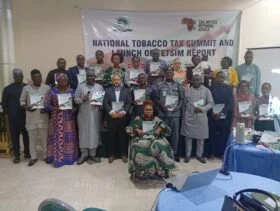The Civil Society Legislative Advocacy Centre (CISLAC) has encouraged the Federal Government to strengthen tobacco taxation as a proven tool for protecting public health and promoting healthier lifestyles across Nigeria.
CISLAC Executive Director, Mr Auwal Rafsanjani, made the remarks on Wednesday in Abuja at the Tobacco Tax Summit and launch of the Tobacco Excise Tax Simulation (TETSiM) Report.
He emphasised that taxes on tobacco and other harmful products were not just revenue sources but essential measures to safeguard citizens’ health.
“Consumption taxes on luxury and harmful products help reduce use and protect public health. That is why economists call them sin taxes,” Rafsanjani said.
Citing a World Health Organisation (WHO) report, he highlighted that effective tobacco control could save millions of lives each year, particularly among young people and low-income communities.
Rafsanjani hailed Nigeria’s progress since adopting a mixed excise tax system for cigarettes in 2018 and urged the country to build on the foundation to meet and surpass ECOWAS and WHO standards.
He commended the Federal Ministries of Finance and Health, the Federal Inland Revenue Service, Nigeria Customs Service, and the Tobacco Tax Technical Working Group for their ongoing contributions.
He also acknowledged international partners, including Tax Justice Network Africa, the African Capacity Building Foundation, and the Campaign for Tobacco-Free Kids, for their collaboration in advancing tobacco control.
Rafsanjani expressed optimism that the summit would “catalyse a comprehensive and effective tobacco tax regime in Nigeria,” helping reduce smoking prevalence and supporting a healthier population.
Presenting a paper on the WHO Framework Convention on Tobacco Control (FCTC), Mr Abraham Emmanuel of the Federal Ministry of Health called for sustained public awareness campaigns on the dangers of tobacco use.
He also emphasised the need for effective warning labels and regular tax adjustments to reflect inflation and rising consumer purchasing power, ensuring tobacco products remained less affordable and less accessible.
Mr Dayi Damurak of the Federal Ministry of Finance noted that tobacco taxation aligned with Nigeria’s sustainable economic growth goals and the country’s commitments under the WHO tobacco control framework.
The News Agency of Nigeria (NAN) reports that the summit was organised by CISLAC in collaboration with the University of Cape Town’s Research Unit on the Economics of Excisable Products and Tax Justice Network Africa.
The event also featured the launch of the Tobacco Excise Tax Simulation (TETSiM) Report, which provides evidence-based insights to help strengthen Nigeria’s tobacco tax system.



